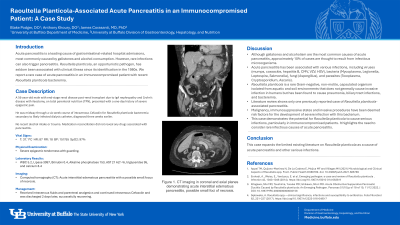Sunday Poster Session
Category: Biliary/Pancreas
P0154 - Raoultella Planticola-Associated Acute Pancreatitis in an Immunocompromised Patient: A Case Study
Sunday, October 27, 2024
3:30 PM - 7:00 PM ET
Location: Exhibit Hall E

Has Audio

Blake Podger, DO
University at Buffalo
Buffalo, NY
Presenting Author(s)
Blake Podger, DO, Anthony Khoury, DO, James G. Corasanti, MD, PhD
University at Buffalo, Buffalo, NY
Introduction: Acute pancreatitis, characterized by sudden inflammation of the pancreas, is one of the leading causes of gastrointestinal-related hospital admissions. Pancreatitis is most frequently attributed to gallstones and alcohol consumption. However, less common etiologies, such as infections, should not be overlooked. Raoultella planticola, an opportunistic pathogen identified in the 1980s, has rarely been implicated in clinical illness. We present a unique case of acute pancreatitis in an immunocompromised patient with recent Raoultella planticola bacteremia.
Case Description/Methods: A 56-year-old male with end-stage renal disease post-renal transplant due to IgA nephropathy and Crohn’s disease with ileostomy, on total parenteral nutrition (TPN), presented with a one-day history of severe epigastric pain. He was midway through a six-week course of intravenous Cefazolin for Raoultella planticola bacteremia secondary to likely infected dialysis catheter, diagnosed three weeks earlier. He denied alcohol intake and recent trauma. Medication reconciliation did not reveal any drugs associated with pancreatitis. On arrival, he was afebrile and hemodynamically stable. Physical examination revealed severe epigastric tenderness with guarding. Laboratory studies showed a lipase level of 3097 U/L, with normal bilirubin, alkaline phosphatase, AST, ALT, triglyceride, and calcium levels. Computed tomography (CT) indicated acute interstitial edematous pancreatitis with a possible small focus of necrosis. The patient continued intravenous Cefazolin, received parenteral analgesics, and successfully recovered.
Discussion: Acute pancreatitis has been associated with various infections, including viruses (mumps, coxsackie, hepatitis B, CMV, VZV, HSV), bacteria (Mycoplasma, Legionella, Leptospira, Salmonella), fungi (Aspergillus), and parasites (Toxoplasma, Cryptosporidium, Ascaris). Raoultella planticola, a rare opportunistic bacterium, is known to cause pneumonia, biliary tract infections, and bacteremia. A review of the literature unearthed only one previous case of Raoultella planticola-associated acute pancreatitis. Our patient demonstrates the potential of this bacterium to cause severe infections, including pancreatitis, especially among hospitalized and immunocompromised individuals. This case highlights the importance of considering rare infectious etiologies in acute pancreatitis and adds to the existing literature on Raoultella planticola as a cause of severe illness.
Disclosures:
Blake Podger, DO, Anthony Khoury, DO, James G. Corasanti, MD, PhD. P0154 - Raoultella Planticola-Associated Acute Pancreatitis in an Immunocompromised Patient: A Case Study, ACG 2024 Annual Scientific Meeting Abstracts. Philadelphia, PA: American College of Gastroenterology.
University at Buffalo, Buffalo, NY
Introduction: Acute pancreatitis, characterized by sudden inflammation of the pancreas, is one of the leading causes of gastrointestinal-related hospital admissions. Pancreatitis is most frequently attributed to gallstones and alcohol consumption. However, less common etiologies, such as infections, should not be overlooked. Raoultella planticola, an opportunistic pathogen identified in the 1980s, has rarely been implicated in clinical illness. We present a unique case of acute pancreatitis in an immunocompromised patient with recent Raoultella planticola bacteremia.
Case Description/Methods: A 56-year-old male with end-stage renal disease post-renal transplant due to IgA nephropathy and Crohn’s disease with ileostomy, on total parenteral nutrition (TPN), presented with a one-day history of severe epigastric pain. He was midway through a six-week course of intravenous Cefazolin for Raoultella planticola bacteremia secondary to likely infected dialysis catheter, diagnosed three weeks earlier. He denied alcohol intake and recent trauma. Medication reconciliation did not reveal any drugs associated with pancreatitis. On arrival, he was afebrile and hemodynamically stable. Physical examination revealed severe epigastric tenderness with guarding. Laboratory studies showed a lipase level of 3097 U/L, with normal bilirubin, alkaline phosphatase, AST, ALT, triglyceride, and calcium levels. Computed tomography (CT) indicated acute interstitial edematous pancreatitis with a possible small focus of necrosis. The patient continued intravenous Cefazolin, received parenteral analgesics, and successfully recovered.
Discussion: Acute pancreatitis has been associated with various infections, including viruses (mumps, coxsackie, hepatitis B, CMV, VZV, HSV), bacteria (Mycoplasma, Legionella, Leptospira, Salmonella), fungi (Aspergillus), and parasites (Toxoplasma, Cryptosporidium, Ascaris). Raoultella planticola, a rare opportunistic bacterium, is known to cause pneumonia, biliary tract infections, and bacteremia. A review of the literature unearthed only one previous case of Raoultella planticola-associated acute pancreatitis. Our patient demonstrates the potential of this bacterium to cause severe infections, including pancreatitis, especially among hospitalized and immunocompromised individuals. This case highlights the importance of considering rare infectious etiologies in acute pancreatitis and adds to the existing literature on Raoultella planticola as a cause of severe illness.
Disclosures:
Blake Podger indicated no relevant financial relationships.
Anthony Khoury indicated no relevant financial relationships.
James Corasanti indicated no relevant financial relationships.
Blake Podger, DO, Anthony Khoury, DO, James G. Corasanti, MD, PhD. P0154 - Raoultella Planticola-Associated Acute Pancreatitis in an Immunocompromised Patient: A Case Study, ACG 2024 Annual Scientific Meeting Abstracts. Philadelphia, PA: American College of Gastroenterology.
